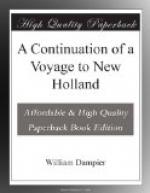After noon, being near the end of the isle Pentare which lies west from Misacomba, we saw many houses and plantations in the country, and many coconut-trees growing by the seaside. We also saw several boats sailing across a bay or channel at the west end of Misacomba, between it and Pentare. We had but little wind, and that at north, which blows right in with a swell rolling in withal; wherefore I was afraid to venture in, though probably there might be good anchoring and a commerce with the natives. I continued steering to the west, because, the night before at sun-setting, I saw a small round high island to the west of Pentare, where I expected a good passage.
The passage between Pentare and Laubana.
We could not that day reach the west end of Pentare, but saw a deep bay to the west of us, where I thought might be a passage through, between Pentare and Laubana. But as yet the lands were shut one within another, that we could not see any passage. Therefore I ordered to sail 7 leagues more westerly, and lie by till next day. In the morning we looked out for an opening but could see none; yet by the distance and bearing of a high round island called Potoro, we were got to the west of the opening, but not far from it. Wherefore I tacked and stood to the east, and the rather, because I had reason to suppose this to be the passage we came through in the Cygnet mentioned in my Voyage round the World; but I was not yet sure of it because we had rainy weather, so that we could not now see the land so well as we did then. We then accidentally saw the opening at our first falling in with the islands; which now was a work of some time and difficul to discover. However before 10 o’clock we saw the opening plain; and I was the more confirmed in my knowledge of this passage by a spit of sand and 2 islands at the north-east part of its entrance. The wind was at south-south-west and we plied to get through before night; for we found a good tide helping us to the south. About 7 or 8 leagues to the west of us we saw a high round peaked mountain, from whose top a smoke seemed to ascend as from a volcano. There were 3 other very high peaked mountains, 2 on the east and one on the west of that which smoked.




